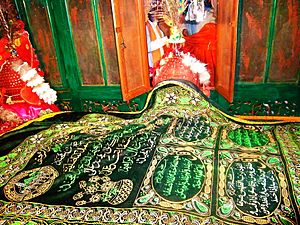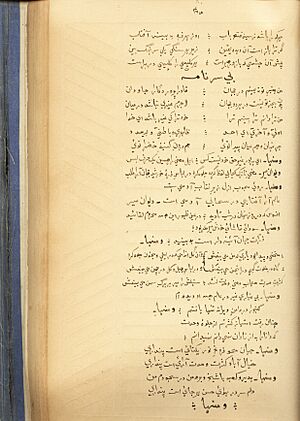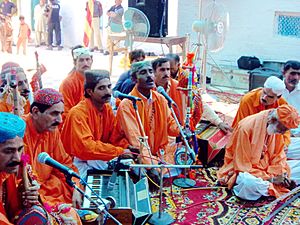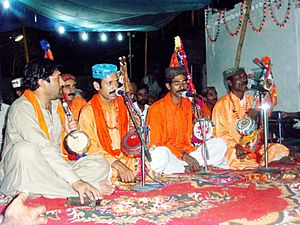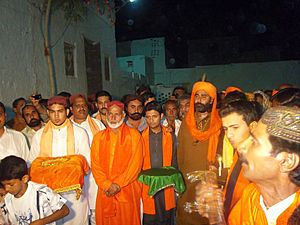Qadir Bux Bedil facts for kids
Quick facts for kids Faqir Qadir Bux Bedil |
|
|---|---|
| فقير قادر بخش بيدل | |
| Born | 1814 Rohri, Sind Province, British India |
| Died | January 15, 1873 (aged 58–59) Rohri, Sind Province, British India |
| Venerated in | Islam, Hinduism |
| Influences | Lal Shahbaz Qalandar, Shah Abdul Latif Bhittai, Sachal Sarmast |
| Influenced | Bekas, Nawab Ali Shah Sikayal, Qazi Baba, Baba Nebhraj, Paro Shah, Allah Bux Mast |
|
Tradition or genre
|
Poetry, Prose |
Faqir Qadir Bux Bedil (Sindhi: فقير قادر بخش بيدل) (1814–1873) was a very important Sufi poet and scholar. He is best known by his pen name, Bedil, which means 'one without a heart'. He was a brilliant writer, just like the famous poets Shah Abdul Latif Bhittai and Sachal Sarmast.
Bedil and his son, Bekas, were also highly respected poets. They wrote their poems in Sindhi, Saraiki, and Persian languages.
Contents
Early Life of Bedil
Bedil was born in 1814 in Rohri, a city in what was then British India. He came from a very religious family. His father, Khalifa Muhammad Mohsun, was a follower of Sayed Mir Janullah Shah Rizwi. Mir Janullah Shah was a well-known saint and a leader of many Sufi followers.
This meant Bedil grew up in a spiritual home, guided by Mir Janullah Shah. When Bedil was born, he was named Abdul Qadir. However, he preferred to be called Qadir Bux.
A story says that when he was born, the midwife told his father that the baby had a twisted foot. His father replied, "He is not physically handicapped. In fact, he is the flag of Rohri city." This statement proved true as Bedil became very famous.
Bedil was a very devoted Muslim. He lived his life strictly following Sharia law, which are Islamic rules. He lived a simple life and gave away what he received to those in need.
He believed in using "platonic love" (Ishq-e-Majazi) to reach "spiritual love" (Ishq-e-Haqiqi). This is a Sufi idea about how to get closer to God. Even with his twisted foot, he traveled long distances. He visited the shrine of Lal Shahbaz Qalandar in Sehwan and Sufi Shah Inayat Shaheed in Jhok Sharif. He also went to Daraza to visit the shrine of Sachal Sarmast.
Bedil's Writings
Bedil wrote a lot of poetry, perhaps more than any other poet in Sindh. He wrote in Persian, Sindhi, Saraiki, Arabic, and Urdu. He created about 10 books of poetry.
Two of his most famous Sindhi works are Wahdat Namo (Book of Union) and Surood Namo (Book of Melody). In total, he wrote around 23 books of prose and poetry.
Some of his well-known works include:
- Masanavi Riyaz-ul-faqr
- Diwan-e-Sulook-ul-Talbin
- Diwan Minhaj-ul-Haqiqat
- Rumuz-ul-Qadri
- Masanavi Nahr-ul-Bahr
- Punj Gunj
- Diwan Musbah-ul-Tariqat
- Wahadat Namo
- Sarood Namo
- Diwan-e-Bedil (Sindhi)
- Masnavi Dilkusha
- Diwan-e-Bedil (Farsi)
- Fe Batn Ahadees
- Taqwiyat-ul-Quloob
- Zahoor Nama
- Qurat-ul-Ain Fe Manaqib-ul-Sibtain
- Insha-e-Qadri
- Tarikhai Wafat
- Khutbat-e-Juma
- Fawaid-e-Manavi
- Kursi Nama
- Ramooz-ul-Arfin
Scholar Nabi Bux Khan Baloch called Bedil the last Sufi saint who wrote about mysticism and the history of Sindh. Bedil taught about spiritual ideas through his poems. His book Wahadat Namo shares the main ideas of Sufism. Bedil was also the first scholar to write about the history of Jhok Sharif and the sacrifice of Sufi Shah Inayat Shaheed.
Bedil's Poetry
Bedil wrote many beautiful poems. One famous poem is an elegy, a sad poem, written when Sachal Sarmast died. This poem honored Sachal Sarmast and also made Bedil himself more famous.
Meaning in His Verses
Here are some of his poetic lines, translated into English:
The one whom you seek after,
Is none but your own self.
If you recognise yourself,
Then none other exists.
This and that are same,
Just like voice, sound and echo.
Bedil! let it not slip from thy hands,
The trade of unitive state,
O' traveler of Sufi path! this thought is profitable.
O Bedil leave good and evil,
Go and seek divine love.
Divine love came; reasoning taken away, loads of miseries befell on me,
Heard of pain and separation, likewise agony came in my chest,
Bedil sans love, living in this world is meaningless.
Except Him, whatever (I) understood,
O Bedil! love made me forget.
Die before you die,
Then you, O Brave, turn into real Muslim.
Your love is treasure,
Every breath is a special jewel,
Believe it O brave man,
Make the trade of unity,
Achieve the status of self-annihilation,
Eat the fruits of eternity,
With your eyes shall behold every moment,
The exhibition of celestial light.
While standing, sitting, talking or listening,
Keep this remembrance in your body,
Clean the mirror with this (mirror-cleaning) solution.
Urs Celebration
Every year, a special celebration called an Urs is held to remember Bedil. This event marks the anniversary of his death. It takes place at his shrine (Dargah) in Rohri.
The Urs is held on the 14th, 15th, and 16th days of Dhu al-Qi'dah. This is the eleventh month of the Muslim calendar. Thousands of his Murids (disciples or followers) come to pay their respects to the great saint-poet.
See also
- Sufism in Sindh
 | Janet Taylor Pickett |
 | Synthia Saint James |
 | Howardena Pindell |
 | Faith Ringgold |


